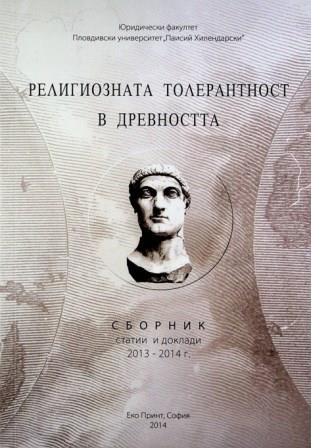Религиозната нетолерантност в Испания през III в
Religious Intolerance in III in Spain
The Constitutions of the Emperors and the Persecution of Christians
Author(s): Federico Fernández de Buján
Subject(s): Law, Constitution, Jurisprudence, History of Law, Canon Law / Church Law, Roman law
Published by: Пловдивски университет »Паисий Хилендарски«
Keywords: religion; intolerance; Spain; persecution of christians
Summary/Abstract: The article examines the ideological and political basis for the persecutions of Christians in I-III AD. The meaning of the ‘’persecutions of Christians’’ is identified as any sever measure of repression upon the religion of Christians and more so against the practice of their religion.The reasons are analysed for the tolerance on part of Rome when it comes to the religions of the conquered peoples and the contrasting hostility towards Christianity. It is, furthermore accepted that while other religions including Judaism coexist peacefully within the framework of the Roman state religion while the first Christians moved by the evangelic of Christ developed an active proselytizing and preached a massage of salvation in order to make all the people of the world to accept Christianity. Their definitive refusal to conduct rituals typical of the recognized state religion in Rome and to follow in the cult for the emperor was understood as pejorative towards the Republic ‘’Res Publica’’ and should therefore be punished with at most severity in order to discourage such activities. Thus Christians are treated as enemies of the Empire, persecuted as criminals and their followers prosecuted as well.The emperors’ main acts of persecutions are also examined. Some of the most important martyrs in Spain are also brought to light as examples for Christians and individuals exemplifying the groups to which they belong; worshipped throughout the ages and up until now as defenders and very often patrons.
Book: Религиозната толерантност в древността : Сборник статии и доклади 2013-2014
- Page Range: 32-38
- Page Count: 7
- Publication Year: 2014
- Language: Bulgarian
- Content File-PDF

